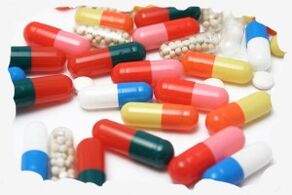
The basis of prostate adenoma treatment is the appointment of various medications for prostatitis.
The complexity of treating this disease lies in the diversity, and sometimes in the complexity of the causes of its occurrence. Therefore, before prescribing any medicine for the treatment of prostatitis, a man is sent for testing to accurately determine the cause of the disease in this particular case.
And even in the case of a correct and accurate diagnosis of prostate adenoma, treatment with medications in some cases can last for years. Independent attempts to get rid of inflammation of the gland will only contribute to the transition of the disease into a chronic form.
Groups of drugs for prostatitis:
- antibacterial;
- non-steroidal anti-inflammatory;
- hormonal;
- antispasmodics;
- alpha blockers;
- muscle relaxants;
- herbal preparations;
- bioregulatory peptides.
Treatment of prostate adenoma with antibacterial drugs is prescribed if the inflammatory process is caused by a bacterial infection.
To date, with acute and chronic inflammation of the prostate caused by a bacterial infection, 7 groups of antibiotics can be prescribed:
- Protected penicillins - taken 2 times a day for 1000 mg with an interval of 12 hours between doses for 10 days.
- Cephalosporins of the III generation - taken for 10 days 1 time a day intravenously, 2 ml, or 2 times a day intravenously / intramuscularly, 1 ml.
- IV generation cephalosporins - taken 1 time a day for 7 days, 2 ml intramuscularly or intravenously.
- Aminoglycosides - take 1 ml for a week 1 time a day intramuscularly.
- Fluoroquinols generation II - take 1-2 weeks twice a day, 200 mg.
- Fluoroquinols of the III generation - take for 5 days, 1 tablet per day at a dose of 500 mg.
- Macrolides - taken twice a day, 500 mg for 14 days.
In parallel with the appointment of antibiotics, prostatitis in men is treated with NSAIDs. Non-steroidal anti-inflammatory drugs for prostatitis in men are prescribed to reduce inflammation in the gland and eliminate pain.
If NSAIDs do not cope with the function assigned to them, then the patient is prescribed hormonal drugs for prostate adenoma.
Since urinary retention is observed in patients with prostate adenoma, men are also prescribed drugs for prostatitis, which would improve urine output (alpha-adenoblockers). It is important to understand that alpha-blockers do not cure the disease, but only eliminate the symptoms caused by it (acute and chronic urinary retention) by relaxing the smooth muscles of the urethra.
In addition to these drugs, various antispasmodics are often prescribed for prostate adenoma, which can eliminate pain, improve microcirculation, and normalize the flow of glandular secretions by relaxing the smooth muscles of blood vessels.
Due to the pain in a patient with prostate adenoma, reflex spasm of the muscles of the perineum appears, which in the future only complicates the appearance of the disease, making it even more difficult to urinate and increasing the pain syndrome. To avoid this and make you feel better, the patient is prescribed muscle relaxants.
Special attention should be paid to such a group of drugs as bioregulatory peptides. These are new drugs for the treatment of prostatitis, which do not fight the causative agent of inflammation and do not reduce pain, but accelerate the healing process, as they stimulate the regeneration of the gland and normalize metabolic processes in them. These drugs create bioregulatory peptides from the prostate gland of cattle, so after their use the process of tissue regeneration occurs quite quickly.
Also, for the treatment of prostate adenoma, various herbal preparations are used for prostatitis. You can prepare herbal preparations yourself (decoctions, infusions), or you can buy ready-made herbal preparations in capsules or solutions.
Homeopathic remedies for prostatitis.
In addition to the listed drugs, homeopathic remedies are also used. Unlike other medicines, homeopathic remedies for prostatitis do not suppress the symptoms of the disease, but treat it by activating the body's defenses. The activation of the defense forces occurs according to the principle of "treating like with like", that is, complex homeopathic preparations cause the same symptoms as prostate adenoma, and using them in a small concentration, you can stimulate the body's fight againstinflammation of the prostate.
Monastery syrup for prostatitis
Prostatitis often affects men in adulthood. The disease manifests itself at the most inopportune moment, most often already in the chronic phase. There is discomfort, itching and pain. In addition, against the background of prostatitis, serious consequences can develop. One of the conditions for a positive complex treatment is the inclusion of Manastic syrup in therapy. Already in the third week of therapy, the man feels much better, all the symptoms of this serious disease disappear: pain, problems with urination, inflammation. Immunity, under the influence of the active components of the syrup, is significantly strengthened, strength is restored, the body receives a complex of essential vitamins and trace elements. Since the drug is completely natural, many experts prescribe it for the prevention of prostatitis for all men after 40 years. This is one of the best remedies for prostatitis.
Chinese medicines for prostatitis
Due to the reputation of oriental medicine as a cure-all, many patients with chronic inflammation of the prostate gland are following with interest the release of various Chinese medicines on the domestic market.
The only thing you really need to ask is if it is allowed to be sold in other countries.






















